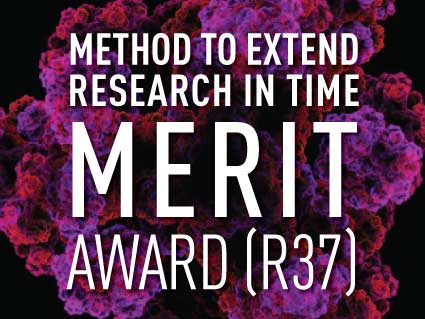
Retooling NCI MERIT Awards to Support Budding Cancer Researchers
February 16, 2018, by Norman E. Sharpless, M.D.
Nearly every established cancer researcher recalls the travails of securing their first independent grants. They also likely remember that the struggle didn’t end there, that more hard work was needed to secure that next round of funding so they could complete important projects and further establish themselves in their profession.
That’s why NCI has worked so hard over the past several years to help investigators who are early in their careers secure stable grant funding, allowing them to make the successful transition to independent researchers who are running their own labs and leading their own projects.
And that’s why, at this critical juncture in cancer research, NCI has launched a new effort to further aid some of these investigators. We are retooling an existing grant mechanism, called the Method to Extend Research in Time (MERIT) R37 Award, using it strictly to help early-stage investigators by extending the length of time they can receive funding under their first independent NIH grant.
This change will help to stabilize our pipeline of talented investigators who can translate what we are learning today into the advances and breakthroughs of tomorrow.
From R01 to R37: More Time, More Opportunity
The concerns in the cancer research community about the impact of essentially stagnant funding levels over the past decade are well known. At a time when the number of grant requests has only continued to increase, NCI has not been able to fund nearly as many as we would like.
Early-stage investigators—generally speaking, those who have completed their education within the past decade and have not yet received their first independent NIH research grant—have been particularly affected by the uncertainty and unrest created by this funding lag.
Leaders at NCI have demonstrated a strong commitment to attracting and retaining talented individuals to the cancer research field by helping new investigators get funding and further their careers. That includes everything from establishing greater flexibility for funding grant applications from early-stage investigators to holding workshops to help new grantees navigate the complicated funding infrastructure.
I intend to continue building on these earlier efforts. I’m particularly excited about this change to the R37 award, which will help to relieve some of the pressure on early-stage investigators who have secured a new research grant by allowing them to focus on doing their best research and building their careers.
Under this change, early-stage investigators who receive an R01 award—the most common award for investigator-initiated grants—will be eligible to have their grant transitioned to an R37 award and, as a result, have the opportunity to have their funding extended by up to 2 years. In other words, a 5-year R01 grant could become a 7-year R37 grant.
That additional 2 years of funding, we believe, can spur these early-stage investigators to focus more time and energy performing research rather than applying for a renewal of their original R01.
A More Stable Cancer Research Pipeline, A Brighter Future
This change will begin with R01 applications submitted by early-stage investigators for fiscal year 2018.
NCI program staff will identify eligible candidates for the award and submit their grant applications to the National Cancer Advisory Board (NCAB) and NCI leadership for consideration.
If recommended by NCAB and approved by NCI leadership, eligible grants will be converted to R37 awards. Even in cases where a grant is converted to an R37, after 4 years, investigators on these grants must still submit a request to secure the time extension and additional funding. The process, however, will be less cumbersome and time consuming than submitting an R01 renewal application.
Of course, not every early-stage investigator with an R01 will be able to benefit from this change. But my expectation and hope is that many will. Importantly, those investigators who do not receive the extension can still go through the standard process for applying for another R01 grant to continue their research.
This is just one change. But it’s an important one that NCI leadership hopes can provide some additional support to some of our emerging research talents and allow them to reach new heights of success—something from which we can all benefit.
























.png)









No hay comentarios:
Publicar un comentario